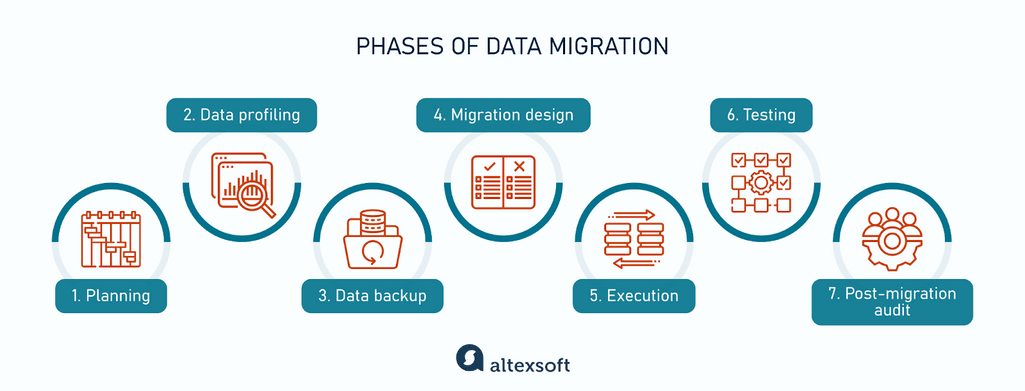Understanding Data Migration
Data migration is a critical process that involves transferring data between storage devices, formats, or applications. This task is often necessary during system upgrades, consolidating databases, or shifting to the cloud. By understanding the nuances of data migration, organizations can effectively assess their needs and identify the most suitable strategies for execution.
There are various types of data migration that companies may encounter throughout their lifecycle. Cloud migration is one of the most common forms, which involves moving data from on-premises systems to cloud-based environments. This is particularly relevant as businesses increasingly adopt cloud technologies. Additionally, database migration is another significant type, focused on transferring databases from one system to another, which can occur due to upgrades or platform changes.
Despite the advantages and benefits associated with data migration, organizations often face numerous challenges. These could include compatibility issues, data integrity concerns, or the potential for data loss during transfer. Moreover, selecting the appropriate tools and ensuring minimal downtime can also present hurdles that require careful planning and execution. Consequently, businesses may find that trying to manage these complexities in-house can be overwhelming and resource-intensive.
Outsourcing your data migration project to specialized BPO (Business Process Outsourcing) providers can alleviate many of these challenges. These firms often possess the expertise and tools necessary to streamline the migration process, ensuring efficient and secure transferring of data. Thus, initiating an outsourcing strategy not only mitigates risks but also enhances overall migration outcomes. Recognizing the importance of partnering with experienced professionals is vital for organizations aiming to improve their data migration processes without compromising existing operations.
Cost Efficiency and Resource Allocation
Outsourcing your data migration project can significantly enhance cost efficiency for businesses of all sizes. By engaging a third-party service provider specializing in data migration, organizations can avoid the substantial expenses associated with hiring and training in-house expertise. These expenses include salaries, benefits, and the allocation of additional resources, which can substantially escalate operating costs. Engaging with a business process outsourcing (BPO) provider allows companies to leverage specialized skills and tools, ensuring a smoother migration process without the burden of managing these costs internally.
Furthermore, outsourcing enables businesses to allocate their resources more effectively. Internal teams can redirect their focus toward core operations and strategy, instead of becoming bogged down by the complexities of data migration. By delegating these responsibilities to experts, companies can maximize the productivity of their staff, as employees can concentrate on the tasks that contribute significantly to achieving business objectives. This optimal allocation of internal resources is critical for organizations aiming to maintain operational efficiency and effective service delivery.
Additionally, the expertise and specialized tools available through external data migration services can often lead to faster and more efficient migration processes. Faster project completion translates to reduced downtime, which not only contributes to sustained business operations but also minimizes potential revenue loss during the transition phase. In this context, the advantages and benefits of outsourcing become increasingly clear; not only does it consider immediate cost savings, but it also supports long-term operational efficacy through enhanced resource management and focus on core competencies.
Access to Expertise and Advanced Technologies
Outsourcing your data migration project to specialized firms provides numerous advantages and benefits, primarily through access to expert knowledge and cutting-edge technologies. Organizations that focus on business process outsourcing (BPO) for data migration have cultivated skills and methodologies that are often beyond the reach of in-house teams. This disparity is particularly crucial given the complexity and sensitivity associated with data migration tasks.
Data migration requires not only a thorough understanding of both the source and destination systems but also expertise in data mapping, validation, and governance. Outsourcing enables companies to leverage the specialized skills of experienced professionals who are well-versed in handling diverse data types and complexities. These professionals stay abreast of the latest industry trends and technologies that enhance the migration process, ensuring that businesses benefit from modern tools and best practices.
Additionally, outsourcing firms invest heavily in advanced technologies that facilitate a more efficient migration process. These may include automated tools that minimize manual intervention, thus reducing the likelihood of errors and enhancing the overall speed of migration. Such tools can also ensure higher levels of data integrity and security during the transfer, addressing common concerns associated with moving sensitive data. By utilizing these advanced resources, organizations can not only achieve a smoother transition but also significantly reduce downtime and disruption to their operations.
Moreover, by delegating data migration to experts who specialize in this domain, businesses can focus on their core activities. They can leverage the time and resources saved to enhance their offerings and improve customer service. This combined approach not only streamlines the migration process but also allows organizations to harness the full potential of their data once the migration is successfully completed. Ultimately, the strategic decision to outsource can lead to a more robust and agile data management environment.
Risk Mitigation and Enhanced Security
Outsourcing your data migration project presents numerous advantages and benefits, especially when it comes to risk management and security enhancement. Engaging professional migration services allows organizations to significantly reduce the risks related to data loss and downtime, two critical concerns during any data transfer. By enlisting the expertise of a Business Process Outsourcing (BPO) provider, companies can accurately plan and execute their data migration, ensuring that safety measures are in place to prevent data corruption during the transition.
One of the most compelling benefits of outsourcing is that specialized migration service providers possess the knowledge and experience required to navigate potential pitfalls effectively. These providers follow industry best practices and utilize advanced techniques to minimize risks associated with data migration. For instance, comprehensive data backups, testing protocols, and phased approaches are common strategies employed by BPOs to ensure that data remains intact and accessible throughout the migration. This diligence helps mitigate unexpected downtimes that may disrupt business operations and lead to financial losses.
Moreover, outsourcing enhances security, particularly concerning the handling of sensitive information. Professional migration services implement robust security measures tailored to meet compliance regulations, safeguarding data against unauthorized access and breaches. By leveraging the latest encryption technologies and data protection protocols, these providers ensure that your information is secure both in transit and at rest. In this context, the advantages and benefits of outsourcing are evident, as these specialized providers are more equipped to manage risk and enhance overall security than internal teams lacking specific expertise.
In conclusion, opting to outsource your data migration project not only reduces potential risks but also adds multiple layers of protection to sensitive data. This strategic approach allows organizations to focus on their core competencies while leaving the complexities of data migration to professionals.





